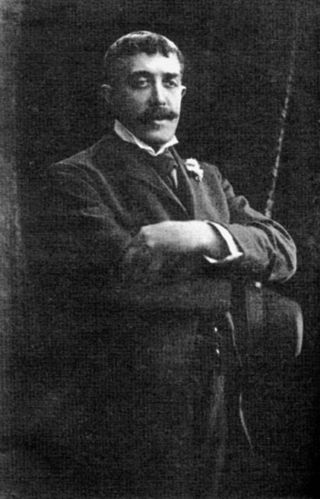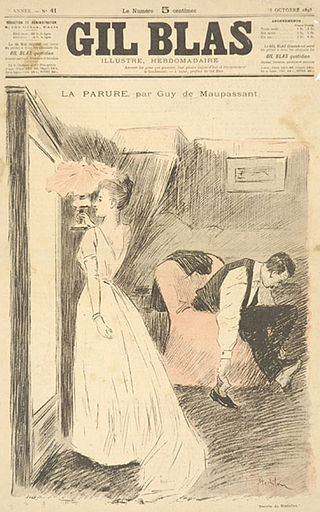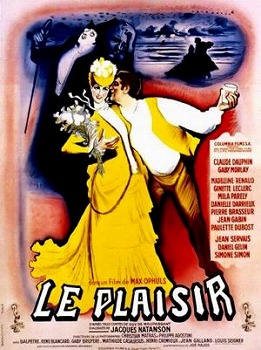Related Research Articles

Henri René Albert Guy de Maupassant was a 19th-century French author, celebrated as a master of the short story, as well as a representative of the naturalist school, depicting human lives, destinies and social forces in disillusioned and often pessimistic terms.

Claude Henri Jean Chabrol was a French film director and a member of the French New Wave group of filmmakers who first came to prominence at the end of the 1950s. Like his colleagues and contemporaries Jean-Luc Godard, François Truffaut, Éric Rohmer and Jacques Rivette, Chabrol was a critic for the influential film magazine Cahiers du cinéma before beginning his career as a film maker.

Jean Lorrain, born Paul Alexandre Martin Duval, was a French poet and novelist of the Symbolist school.

Mathieu Jean Felicité de Montmorency, 1st Duke of Montmorency-Laval was a French statesman during the French Revolution and Bourbon Restoration. He was elected as the youngest member of the National Assembly in 1789. He is also known for his military expertise and his relation with Mme de Staël. When France became a republic, Montmorency turned into an ultra-royalist. Napoleon regarded him as a member of the Catholic opposition. During the Restoration, he became Minister of Foreign Affairs.

Léonie Marie Julie Bathiat, known professionally as Arletty, was a French actress, singer, and fashion model. As an actress she is particularly known for classics directed by Marcel Carné, including Hotel du Nord (1938), Le jour se lève (1939) and Children of Paradise (1945). She was found guilty of treason for an affair with a German officer during World War II.

Doudeville is a commune in the Seine-Maritime department in the Normandy region in northern France.
Une femme coquette (1955) was the first of four short fiction films made by French filmmaker Jean-Luc Godard preceding his work in feature-length narrative film.

"The Necklace" is a short story by French writer Guy de Maupassant. It is known for its twist ending, which was a hallmark of de Maupassant's style. The story was first published on 17 February 1884 in the French newspaper Le Gaulois.

Paul et Virginie is a novel by Jacques-Henri Bernardin de Saint-Pierre, first published in 1788. The novel's title characters are friends since birth who fall in love. The story is set on the island of Mauritius under French rule, then named Île de France. Written on the eve of the French Revolution, the novel is recognized as perhaps Bernardin's finest work. It records the fate of a child of nature corrupted by the artificial sentimentality of the French upper classes in the late eighteenth century. Bernardin de Saint-Pierre lived on the island for a time and based part of the novel on a shipwreck he witnessed there.

Pierre et Jean is a naturalist or psycho-realist work written by Guy de Maupassant in Étretat in his native Normandy between June and September 1887. This was Maupassant's shortest novel. It appeared in three installments in the Nouvelle Revue and then in volume form in 1985, together with the essay “Le Roman” [“The Novel”]. Pierre et Jean is a realist work, notably so by the subjects on which it treats, including knowledge of one's heredity, the bourgeoisie, and the problems stemming from money.
La Maison Tellier may refer to:

Le Plaisir is a 1952 French comedy-drama anthology film by German-born film director Max Ophüls (1902–1957) adapting three short stories by Guy de Maupassant — "Le Masque" (1889), "La Maison Tellier" (1881), and "Le Modèle" (1883).

Le Rosier de Madame Husson is a novella by Guy de Maupassant, published in 1887. The hero is a young virtuous boy, the equivalent of a Rose Queen.
Black Humor is a 1965 black comedy anthology film directed by Claude Autant-Lara, Giancarlo Zagni and José María Forqué.
Guy de Maupassant wrote short stories, novels, travel accounts and poetry.

La Maison Tellier is a collection of short stories by Guy de Maupassant that includes the eponymous story. The book established Maupassant as a prominent French writer following the success of his first short story, "Boule de suif". Five of the eight stories in the collection had already been published in various magazines, like Revue politique et littéraire and La Vie Moderne, and three were originals.

Maxime Feri Farzaneh was a French-Iranian writer and filmmaker. He signed his books "M.F. Farzaneh" and his films "Feri Farzaneh".
Jean-Claude Lutanie is a French writer.

Maurice Leloir was a French illustrator, watercolourist, draftsman, printmaker, writer and collector.

The Terror with Women is a 1956 comedy film directed by Jean Boyer and starring Noël-Noël, Jacqueline Gauthier and Yves Robert. It is an adaptation of the 1882 short story Ce cochon de Morin by Guy de Maupassant, previously adapted as the 1932 film That Scoundrel Morin. The film's sets were designed by the art director Robert Giordani.
References
- Jean-Claude Lutanie, Une lecture paranoïaque-critique de La maison Tellier, Guy de Maupassant, Le Veilleur Éditeur, 1993 – "Maupassantiana - Bibliographie sur Maupassant".